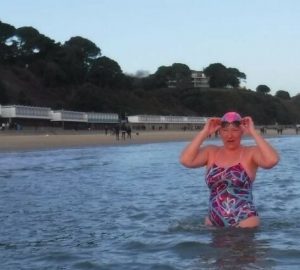Why don’t triathletes like open water swimming (and what can they do about it)?
We’ve recently spent two weekends at triathlon events (the Bike and Triathlon Show in Manchester and the Triathlon Show in Esher) and have been asking triathletes if they like open water swimming. We’ve heard answers such as:
- “No! It’s just something you’ve got to do, isn’t it?”
- “I’m more of a sinker than a swimmer.”
- “It’s horrible. It’s cold, you can’t see where you’re going and people keep hitting you.”
- “I can’t breathe!”
This left us with two further questions. One, why would you do triathlon if you don’t like open water swimming and, two, why don’t triathletes like open water swimming?
We’re really puzzled by the first. Why would you spend time and money and something you don’t like? Why not just stick to running, cycling and duathlon if you don’t like swimming? Perhaps someone can enlighten us.
We do, however, have some theories on the second, and some suggestions to help, if this applies to you.
Firstly, many people in triathlon do not have a swimming background. Figures from a Triathlon Industry Association survey suggest the majority of triathletes came to the sport via running and a significant portion see themselves as cyclists or team sports players. They don’t swim very well and their performance in swimming lags behind their abilities in running and cycling. They struggle in the water and therefore don’t enjoy it.
Secondly, while swimming represents a small portion of a triathlon in terms of time spent you need to get through the swim first. It’s therefore seen as an obstacle to reaching their beloved and frighteningly expensive bicycles: something you just have to do before the real racing begins.
Triathletes always seem in a hurry to get to their bikes
Thirdly, triathlon is (almost) always a race. The start is characterised by hundreds of people trying to fight through the water as fast as possible. It’s a face-down thrash-fest that leaves most people gasping within a few hundred metres and then struggling to survive for the rest of the swim.
Our advice to triathletes in this position is simple: if you want to become a better swimmer you first need to learn to enjoy open water. We suggest you forget, for a while, about speed and develop a love affair with the water.
Step 1 should be to become more technically proficient. Take lessons, read books (e.g. Swim Smooth), take out asubscription to H2Open Magazine and understand why technique is so important in swimming. Stop fighting the water and learn how to feel balanced and at ease, whether you are on your front, side or back, underneath or on the surface. Ideally, try to get into the water three or four times each week (or more) for at least 30 minutes each time.
Step 2 is to measure and monitor your performance. In a pool session use the Pace Clock or a stop watch and time how long it takes you to swim every 100m. Make one session a week a fitness session with specific performance goals as this can be very motivating. We’ve published several features on this subject in H2Open. If you’re new to the sport, take a look at our free train to swim a mile course.
Step 3 is to do some open water swimming outside of a racing or training environment. When questioned more deeply, a number of triathletes who professed to not like open water swimming agreed that they loved swimming in the sea on holiday or could imagine themselves enjoying a relaxing swim in a scenic location. In fact, many places where triathletes swim are scenic. Even the old gravel pits around the M25 have a certain charm and there’s something quite satisfying about swimming there while others are fuming in traffic jams just a short distance away. Instead of thumping out 750m or 1500m circuits as fast as possible take a moment to savour your surroundings and the moment.
Interestingly we’ve spoken to several triathletes who’ve found that swimming has become their favourite discipline once they’d overcome their initial apprehensions and started improving. For some, the potential speed gains (in percentage terms) are much greater than can be achieved in running or cycling and that in itself can be very rewarding.
We also know of at least one former triathlete who has given up on running and cycling in order to train for an English Channel crossing. You might not want to go that far, but by approaching open water as a swimmer rather than as a triathlete you should find you enjoy it much more and, as a bonus, your performance will improve.






